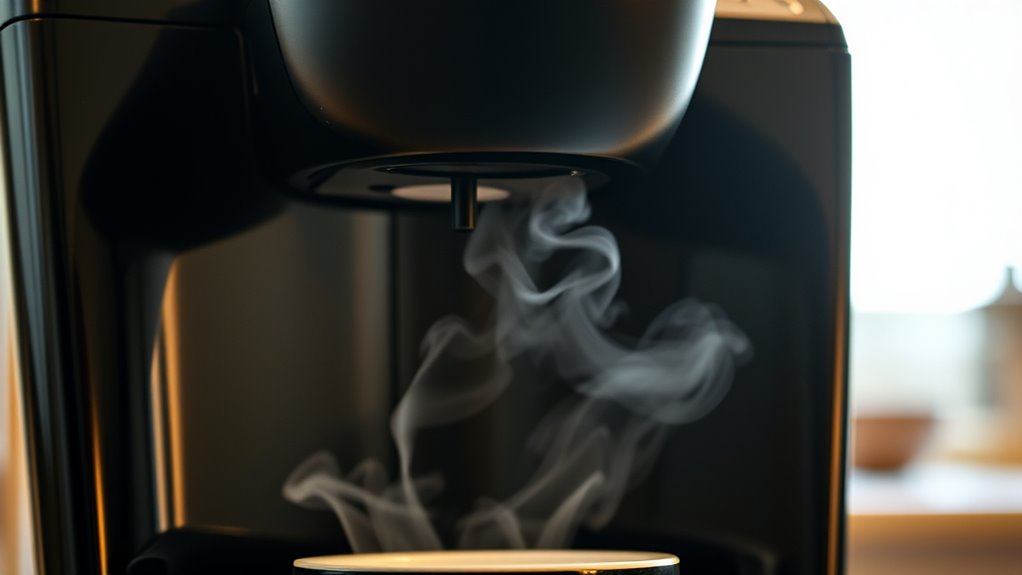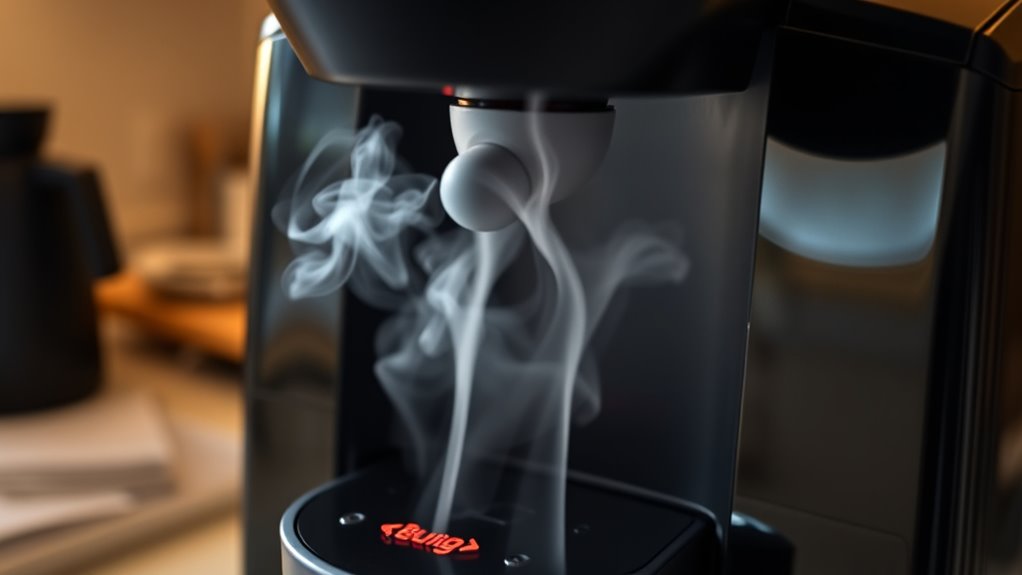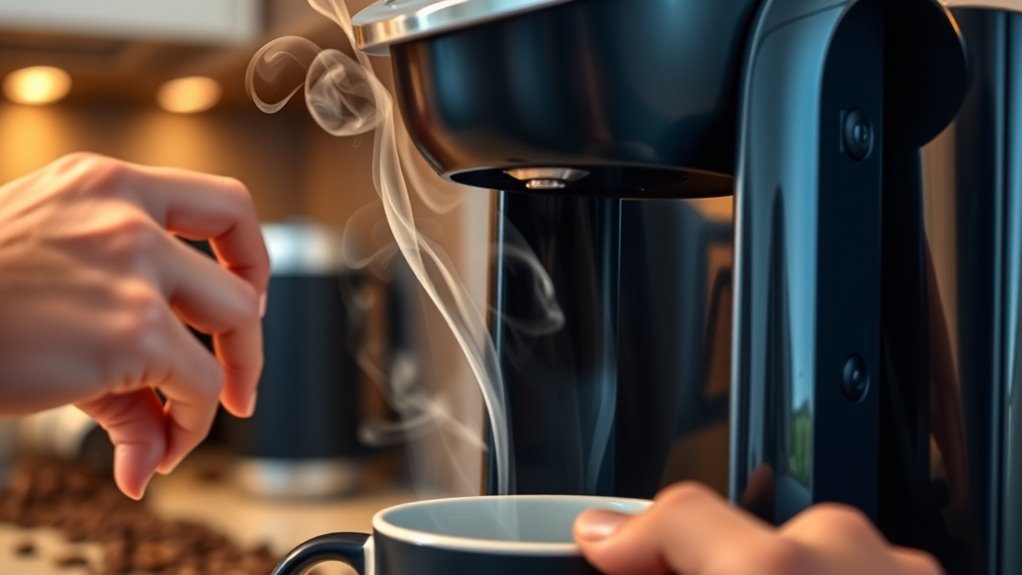If your Keurig’s puffing out smoke, that’s a serious sign something’s off! It could be clogged with hard water minerals or maybe the heating element’s gone rogue. Yikes! First, unplug that bad boy immediately to avoid any fire hazards. And, oh, don’t ignore any funky smells or weird noises—it’s time for some maintenance! Wanna keep your brewmaster in tip-top shape? Stick around to uncover more tips on preventing future smoky situations!
At a Glance
- Smoking in your Keurig may result from mineral buildup, leading to clogs and overheating.
- A faulty heating element can cause internal parts to burn and produce smoke.
- Signs of overheating include steam escaping, burning smells, and unusual noises.
- Regular maintenance, such as monthly descaling and cleaning, can prevent smoking issues.
- Always unplug the machine immediately if you notice smoke to ensure safety.
Causes of Smoking in Keurig Machines

If you’ve ever watched your trusty Keurig puff out smoke like it’s auditioning for a role in a disaster movie, you’re definitely not alone!
One common culprit behind this smoky scene is clogging issues. Mineral buildup from hard water can block the water flow, leading to steam and smoke.
But it doesn’t stop there—sometimes, a faulty heating element can overheat, burning internal parts and causing chaos. Regularly cleaning your Keurig and descaling every few months can help avoid these problems.
Identifying Safety Hazards
Have you ever thought about what could happen if your Keurig starts puffing out smoke? Yikes! It’s essential to be aware of safety hazards. Ignoring those smoke signals can lead to fire risks or nasty burns, so keep your eyes peeled!
Safety precautions are your best friend here—unplugging the machine immediately can save you a lot of trouble. Remember, a little hazard awareness goes a long way. Regularly cleaning your Keurig is key, too; no one wants coffee explosions ruining their morning. Trust me, staying alert and taking care of your machine keeps the coffee flowing and the fires at bay! Additionally, using vinegar cleaning can help maintain your machine and prevent malfunctions that could lead to smoke.
Signs of Potential Overheating

Ever noticed your Keurig giving off a little puff of smoke? That’s no fun!
Keep an eye out for overheating indicators, like steam escaping from the nozzle or a burning smell. If your machine suddenly stops or starts making odd noises, it’s a red flag.
And if you spot discoloration near the heating element, it could mean smoke sources are lurking. Remember, if you see hot water leaking or hear that buzzing sound, your Keurig might be in trouble.
Don’t ignore these signs; they’re your machine’s way of saying, “Help me before I overheat!” Additionally, regular cleaning is essential to prevent clogs that can lead to overheating, especially in K-cup sides.
Maintenance and Prevention Tips
Keeping your Keurig in tip-top shape can feel like a full-time job, but trust me, it’s totally worth it!
Start with daily drip tray empties to dodge overflow and nasty bacteria. Rinse that K-cup holder after each use to keep it fresh.
Weekly, give the water reservoir a warm, soapy bath, and don’t forget to descale monthly—especially if you’re in a hard water zone!
Deep clean every 3 to 6 months to keep things running smoothly. Use filtered water and inspect those power cords regularly.
With a little routine maintenance, you’ll be brewing delicious coffee without a hitch! Additionally, choosing the best Keurig machine suited for your needs can significantly enhance your overall coffee experience.
Troubleshooting Steps to Take

When your Keurig starts smoking, it can feel like a scene straight out of a horror movie—yikes!
Don’t panic; let’s tackle this together. Here are some troubleshooting tips to help:
- Turn off and unplug your Keurig immediately.
- Check for blockages in the water reservoir.
- Inspect the power cord for any damage.
- Look for warning lights on your machine.
- Refer to your user manual for specific fixes.
Often, common user mistakes lead to these issues, so stay calm and follow these steps. Additionally, ensure that you are using compatible K-Cup pods to avoid any brewing complications.
You got this, and soon enough, your coffee will be back on track!
When to Replace vs. Repair Your Keurig
So, how do you know when it’s time to say goodbye to your trusty Keurig instead of trying to fix it up? If you smell smoke or notice leaks that just won’t quit, it might be time for a new one.
Repair costs can pile up, especially if they hit 50% of a new Keurig’s price! If your machine’s older than 5 years or making weird noises, consider replacement options. Additionally, investing in an affordable coffee maker can provide a fresh start for your daily brew routine.
Sure, fixing minor issues is great, but when it feels like you’re playing whack-a-mole with repairs, it’s time to embrace the new. Your coffee deserves better, right?





